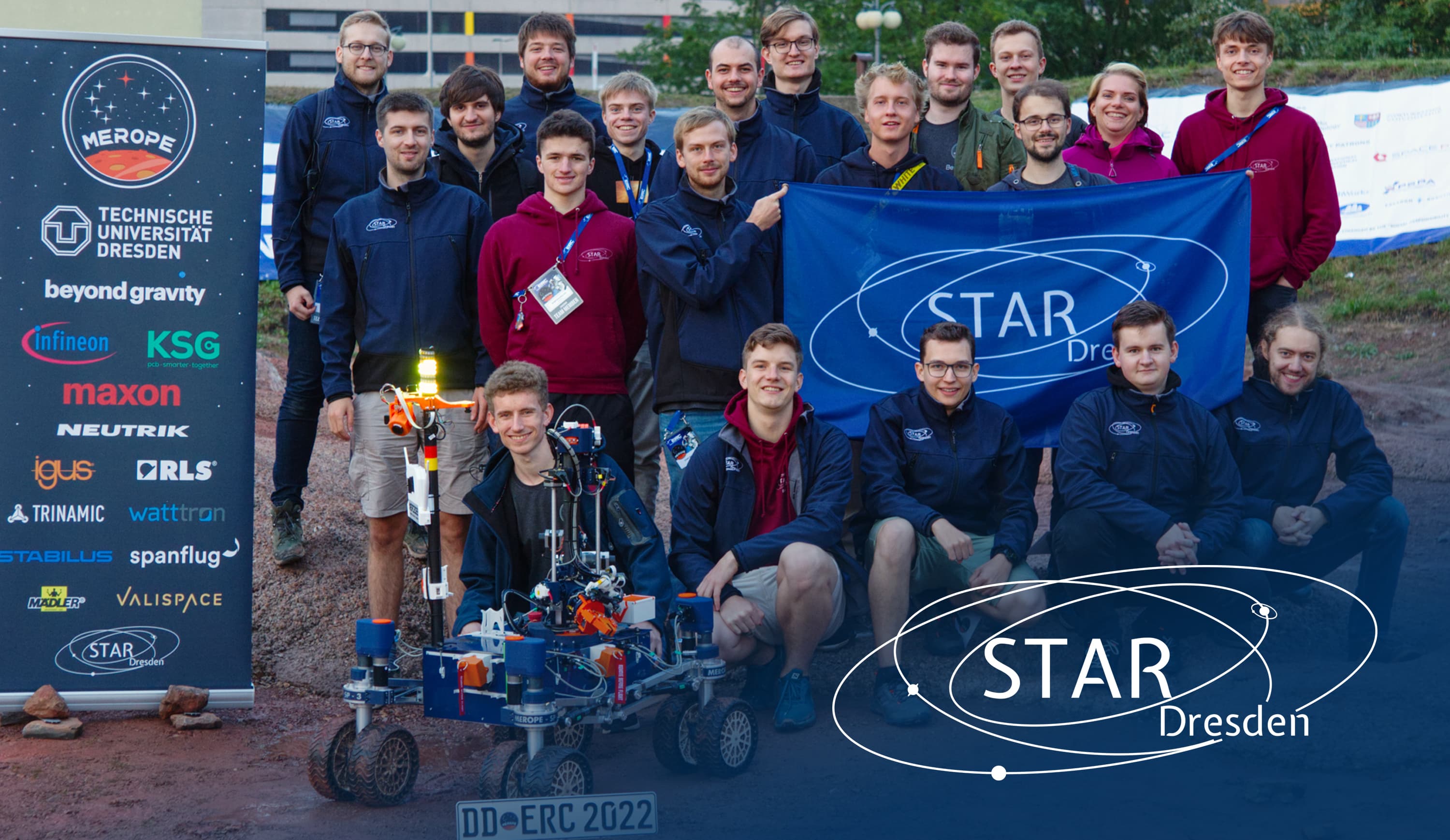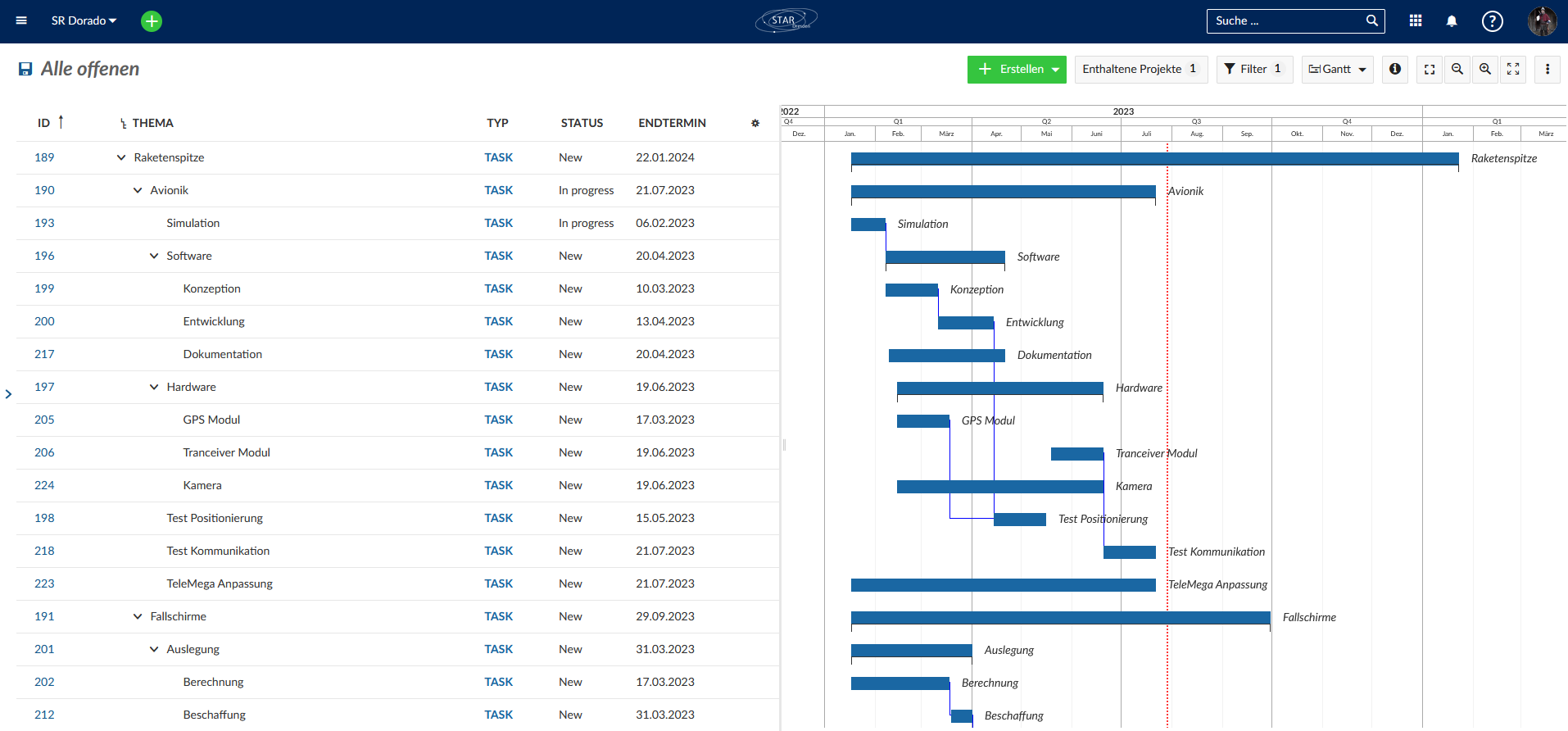
Where no man has gone before: OpenProject at STAR Dresden
In the realm of the TU Dresden’s Institute of Aerospace Engineering resides an exciting hub known as the student working group STAR (studentische Arbeitsgruppe Raumfahrt). The young scientists have one thing in common: they’re enthusiastic about space and space travel. Apart from doing research together, the students also participate in competitions and call for applications. OpenProject is happy to support the group’s exploration, both here on Earth and in distant galaxies.
Introducing STAR Dresden
The student working group STAR Dresden e. V. was founded in 2018. It’s an interdisciplinary community, welcoming students with a shared passion for space exploration. In their first project (Proxima Centauri) the young researchers embarked on the European Space Elevator Challenge (EUSPEC) in Munich. The challenge was to develop an innovative climber capable of navigating a 100-meter-long, vertically tensioned rope, carrying substantial payloads while remaining energy-efficient and swift. Despite Proxima Centauri falling short of the 100-meter mark during the competition, the young researchers decided to tackle further projects.
Last year, STAR Dresden achieved a remarkable triumph at the European Rover Challenge, an annual international competition held in Kielce, Poland. The Mars rover Merope from Dresden convinced in the “Probing” category, showcasing its adeptness in launching and collecting soil samples. Eager to continue their success, STAR Dresden is now developing another rover for the forthcoming European Rover Challenge in September 2023. Their latest creation, the rover Taygeta, is all set to join the thrilling race. To ensure a smooth and efficient mission, the young researchers are relying on OpenProject, among other tools.
OpenProject, renowned for supporting NGOs and open source projects, is happy to sponsor STAR Dresden by providing an Enterprise license for up to 50 users for their self-hosted OpenProject installation. We recently had a chat about the Taygeta project with two members of the student working group: Elias Ortlieb, a student of aerospace engineering, and Julius Gilka-Bötzow, student of information systems engineering. They also provided valuable insights into the utilization of our project management software.
Mission critical: achieving data sovereignty
STAR Dresden currently has about 60 members, and almost all of them are working hard to complete Taygeta. Developing your own Mars rover (even if it ultimately “only” runs on a test site in Europe) involves a lot of planning and coordination of hardware and software. The young scientists already use common open source tools for versioning and managing their own source code, so it makes sense to use an open source project management solution as well. “We prefer open source software,” says Elias, the group’s server administrator. “It’s very important to us that we are in full control over all our data, so proprietary cloud services are out of the question.”
Elias, who is currently writing his diploma thesis, shares his experience with OpenProject during last year’s Rover Challenge. They had already set up the system and started using it, but an unfortunate server failure shortly before the competition resulted in the loss of all the critical data. As work-around, a few team members took charge and reconstructed everything using spreadsheets. “Excel is undeniably a great tool with lots of features,” says Julius. “However, it’s not suited for our complex projects. Last year’s solution turned out to be more of a hack than a genuine win.”
So, in the fall of 2022, the student working group decided to rent a server from a German provider. Emphasizing their dedication to open source software, the group ensured that almost all services were built upon open-source foundations, with a firm commitment to continue working with OpenProject. Elias says that when looking for applications, he makes sure they support single sign-on. “Our goal is to provide our users with a seamless experience through a unified access point, making it more convenient and secure for everyone,” he explains.
Exploring infinite possibilities: implementation and setup
Thanks to the Docker container provided, OpenProject was installed quickly, and the software has proven to be convincing in operation. Elias affirms, “Other solutions failed to win us over, but OpenProject runs seamlessly and is much less memory-intensive.” A big plus is the vast amount of integrations and plug-ins. Julius, as lead software developer responsible for the Taygeta rover’s driving system, would like to see a connection to his own GitLab instance: “If we always separate the hardware and software of the projects, we lose track.”
For this reason, Elias plans to set up the GitLab plug-in soon. Just like the GitHub integration, it displays version management events and relevant information on a separate tab within the work packages. Merge requests, issues, commits, and pending pipeline jobs will then be conveniently accessible through the project management software. Elias notes, “Having full control over our server and the OpenProject installation, we can easily test and implement this. Once it’s up and running, we’ll have planning and tracking our projects all in one place, which would be extremely convenient.”
Since STAR Dresden also runs its own Nextcloud instance on their server, Elias has already configured and tested the Nextcloud integration. However, as of now, the working group primarily deals with software and specifications rather than documents, so they aren’t using the integration yet. Elias and Julius plan to revisit the topic after the challenge in September. They plan to show the other team members what OpenProject can do and how it can enhance their collaborative efforts.
Captain’s log: recording, evaluating, reporting
Apart from the fundamental tasks of creating and tracking projects, sub-projects, and work packages, generating Gantt charts is particularly important for STAR Dresden. These schedules play a crucial role not only in the group’s internal overview but also for documentation purposes. “With a considerable number of projects, organizers frequently detailed reports”, says Julius. “We are required to document every aspect, and OpenProject proves to be an exceptional ally in supporting us throughout this process.”

Elias agrees that the overall impression is right. In particular, he appreciates the well-designed and clear views of task start and end times, which surpass comparable solutions. Looking ahead, the student working group also wants to use OpenProject’s time tracking. Julius says: “We should consider logging the working hours invested in our projects. While it may not directly impact success, it will help us to estimate the workload for the team members in advance.” Elias supports this idea, stating: “This way we can realistically estimate what we can achieve before the next competition and set more achievable goals, rather than reaching for the stars.”
Exploring the future: exciting innovations on the horizon
Thanks for the interview, Elias and Julius. Best wishes to STAR Dresden for the impending Rover Challenge, and may OpenProject continue to be a reliable ally in your future ventures!


